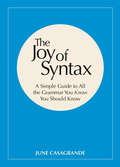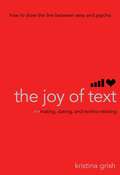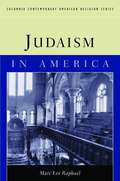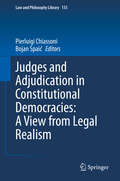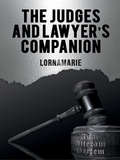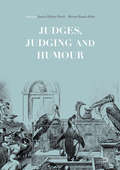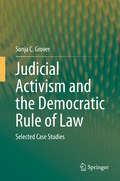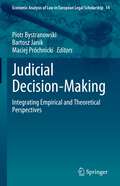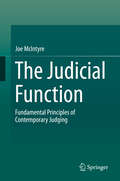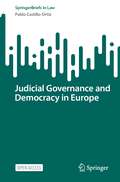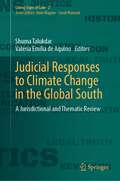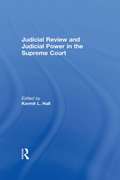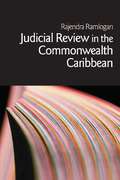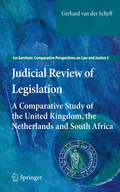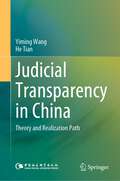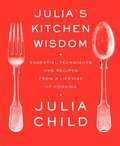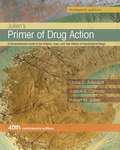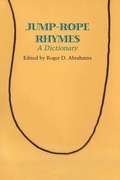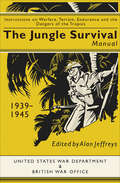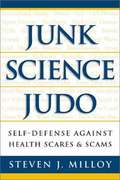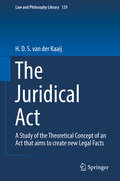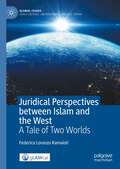- Table View
- List View
The Joy of Syntax: A Simple Guide to All the Grammar You Know You Should Know
by June CasagrandeLanguage columnist June Casagrande presents a fun and breezy guide to everything a grown-up interested in grammar needs to know.When it comes to grammar, it seems like everyone—even die-hard word nerds—feel they "missed something" in school. The Joy of Syntax picks up where sixth grade left off, providing a fresh foundation in English syntax served up by someone with an impressive record of making this otherwise inaccessible subject a true joy. With simple, pithy information on everything from basic parts of speech and sentence structure to usage and grammar pitfalls, this guide provides everything you need to approach grammar with confidence.
The Joy of Text
by Kristina GrishFinally, the software gods have rescued us from our stalled, confused love lives by giving us so many new ways to meet, connect, and share what we want, feel, and mean. Or have they? Dating has never been simple, but in an age of IMs, text messages, e-mails, and BlackBerry notes, it can be an absolute minefield. How can you accurately judge a guy's potential when all you have to go on is his punctuation? What's the best way to maintain your witty, sassy rapport once you've decided to leave the safety of techno-anonymity and take your relationship off-line? When do you remedy a techno-gaffe or know if it's too early to hit send? And how can you gauge his feelings without seeing his body language or even hearing his voice? Enough is enough. In The Joy of Text, real-life cyber-Cyrano Kristina Grish establishes hard and fast rules to help modern women navigate their love lives via technology; offers invaluable tips on how to analyze text, timing, and tone; and provides advice on etiquette in an age when the handwritten thank-you note is all but obsolete.
Judaism in America: A Biographical Dictionary and Sourcebook (Columbia Contemporary American Religion Series)
by Marc Lee RaphaelJews have been a religious and cultural presence in America since the colonial era, and the community of Jews in the United States today—some six million people—continues to make a significant contribution to the American religious landscape. Emphasizing developments in American Judaism in the last quarter century among active participants in Jewish worship, this book provides both a look back into the 350-year history of Judaic life and a well-crafted portrait of a multifaceted tradition today. Combining extensive research into synagogue archival records and secondary sources as well as interviews and observations of worship services at more than a hundred Jewish congregations across the country, Raphael's study distinguishes itself as both a history of the Judaic tradition and a witness to the vitality and variety of contemporary American Judaic life. Beginning with a chapter on beliefs, festivals, and life-cycle events, both traditional and non-traditional, and an explanation of the enormous variation in practice, Raphael then explores Jewish history in America, from the arrival of the first Jews to the present, highlighting the emergence and development of the four branches: Orthodox, Conservative, Reconstructionist, and Reform. After documenting the considerable variety among the branches, the book addresses issues of some controversy, notably spirituality, conversion, homosexuality, Jewish education, synagogue architecture, and the relationship to Israel. Raphael turns next to a discussion of eight American Jews whose thoughts and/or activities made a huge impact on American Judaism. The final chapter focuses on the return to tradition in every branch of Judaism and examines prospects for the future.
Judges and Adjudication in Constitutional Democracies: A View from Legal Realism (Law and Philosophy Library #135)
by Pierluigi Chiassoni Bojan SpaićThe book offers contributions to a philosophical and realistic approach to the place of adjudication in contemporary constitutional democracies. Bringing together scholars from different legal and philosophical backgrounds, the book purports to cast light on the role(s) of judges and the function of judicial interpretation inside of constitutional states, from the standpoint of legal realism as a revisited and sophisticated jurisprudential outlook. In so doing, the book also copes with a few major jurisprudential issues, like, e.g., determining the ideas that make up the core of legal realism, exploring the relation between legal realism and legal positivism, identifying the boundaries of judicial interpretation as they appear from a realist standpoint, as well as considering some skeptical outlooks on the very claims of contemporary legal realism.
The Judges and Lawyer’s Companion
by LornaMarieThe Judges and Lawyer’s Companion’ is a must have and useful tool in the hands of Judges and Lawyers and in deed any one delivering a decision making role formally and informally. This book aims to reduce the valuable time lawyers at the bar and judicial officers on the bench spend looking for the meaning of Latin maxims. Law students seeking quick interpretation and dictionary meaning of Latin maxims will also benefit immensely. I have decided to compile this companion as a reference guide at a glance and I hope this piece of work will find its place on the book shelf of every Judge and Lawyer around the world. The author has carefully illustrated the meaning of each maxim using case authorities wherever possible in court ruling around the world. This book is a linguistic treasure, a robust companion with engaging collection puts revered proverbs at reader’s fingertips. An entertaining volume with a scholarly twist ready to inform, advise, and delight both casual leader and those who appreciate the art of language and the pleasure that lies beneath a rich collection of words, phrases, and expression. The joy of having this maxims companion consists of enabling a better understanding of the law in all its facets, in all ramifications on the aspects upon which they touch.
Judges, Judging and Humour
by Jessica Milner Davis Sharyn Roach AnleuThis book examines social aspects of humour relating to the judiciary, judicial behaviour, and judicial work across different cultures and eras, identifying how traditionally recorded wit and humorous portrayals of judges reflect social attitudes to the judiciary over time. It contributes to cultural studies and social science/socio-legal studies of both humour and the role of emotions in the judiciary and in judging. It explores the surprisingly varied intersections between humour and the judiciary in several legal systems: judges as the target of humour; legal decisions regulating humour; the use of humour to manage aspects of judicial work and courtroom procedure; and judicial/legal figures and customs featuring in comic and satiric entertainment through the ages.Delving into the multi-layered connections between the seriousness of the work of the judiciary on the one hand, and the lightness of humour on the other hand, this fascinating collection will be of particular interest to scholars of the legal system, the criminal justice system, humour studies, and cultural studies.
Judicial Activism and the Democratic Rule of Law: Selected Case Studies
by Sonja C. GroverIn this book the author argues that judicial activism in respect of the protection of human rights and dignity and the right to due process is an essential element of the democratic rule of law in a constitutional democracy as opposed to being ‘judicial overreach’. Selected recent case law is explored from the US and Canadian Supreme Courts as well as the European Court of Human Rights illustrating that these Courts have, at times, engaged in judicial activism in the service of providing equal protection of the law and due process to the powerless but have, on other occasions, employed legalistic but insupportable strategies to sidestep that obligation.The book will be of interest to those with a deep concern regarding the factors that influence judicial decision-making and the judiciary's role through judgments in promoting and preserving the underpinnings of democracy. This includes legal researchers, the judiciary, practicing counsel and legal academics and law students as well as those in the area of democracy studies, in addition to scholars in the fields of sociology and philosophy of law.
Judicial Decision-Making: Integrating Empirical and Theoretical Perspectives (Economic Analysis of Law in European Legal Scholarship #14)
by Piotr Bystranowski Bartosz Janik Maciej PróchnickiThis book shares state-of-the-art insights on judicial decision-making from both theoretical and empirical perspectives. It offers in-depth coverage of the forefront of the field and reviews the most important issues and discussions connected with an empirical approach to judicial decision-making. It also addresses the challenges of judicial psychology to the ideal of rule of law and explores the promise and perils of applying artificial intelligence in law. In closing, it offers empirically-driven guidance on ways to improve the quality of legal reasoning.
The Judicial Function: Fundamental Principles of Contemporary Judging
by Joe McIntyreJudicial systems are under increasing pressure: from rising litigation costs and decreased accessibility, from escalating accountability and performance evaluation expectations, from shifting burdens of case management and alternative dispute resolution roles, and from emerging technologies. For courts to survive and flourish in a rapidly changing society, it is vital to have a clear understanding of their contemporary role – and a willingness to defend it. This book presents a clear vision of what it is that courts do, how they do it, and how we can make sure that they perform that role well. It argues that courts remain a critical, relevant and supremely well-adjusted institution in the 21st century. The approach of this book is to weave together a range of discourses on surrounding judicial issues into a systemic and coherent whole. It begins by articulating the dual roles at the core of the judicial function: third-party merit-based dispute resolution and social (normative) governance. By expanding upon these discrete yet inter-related aspects, it develops a language and conceptual framework to understand the judicial role more fully. The subsequent chapters demonstrate the explanatory power of this function, examining the judicial decision-making method, reframing principles of judicial independence and impartiality, and re-conceiving systems of accountability and responsibility. The book argues that this function-driven conception provides a useful re-imagining of some familiar issues as part of a coherent framework of foundational, yet interwoven, principles. This approach not only adds clarity to the analysis of those concepts and the concrete mechanisms by which they are manifest, but helps make the case of why courts remain such vital social institutions. Ultimately, the book is an entreaty not to take courts for granted, nor to readily abandon the benefits they bring to society. Instead, by understanding the importance and legitimacy of the judicial role, and its multifaceted social benefits, this books challenge us to refresh our courts in a manner that best advances this underlying function.
Judicial Governance and Democracy in Europe (SpringerBriefs in Law)
by Pablo Castillo-OrtizThis is an Open Access book.Amid the growing debate about models of judicial governance and their relationship to democratic quality, this book offers a systematic and empirical study of this relationship. The book thereby contributes to filling in this gap for the European continent. Taking an interdisciplinary politics and law perspective, and combining empirical and theoretical considerations, the book addresses the important link between democracy and judicial governance. In particular, it provides for three interconnected contributions. First, the book provides for a comprehensive classification of European countries into different models of judicial governance. Second, the book analyses empirically the relationship between the design of judicial governance and the quality of democracy. Third, building on those findings, the book presents policy reflections for the reform and improvement of mechanisms for judicial governance in European countries. The book seeks to refine our knowledge about the relationship between judicial governance and democracy, making an important academic and social contribution. In an era in which many democracies backslide and deconsolidate, it assesses to what extent existing mechanisms for judicial governance have contributed to the stability and quality of democratic systems in which they are implemented. Furthermore, the book puts forward reflections to improve the role of organs for judicial governance in fostering the quality of democracy. Since the book introduces in an accessible form key concepts of Judicial Governance, it will be of interest for the general public as well as academics and students in the fields of Law and Political Science. The book also addresses policy makers, as based on our empirical knowledge about the interaction judicial governance and democracy it puts forward ideas for a design of judicial governance that is more capable of protecting democratic systems of government.
Judicial Process
by Prof. Dr. G.P. Tripathi G.G. Padmakar TripathiThe book Judicial Process by Prof. G.P. Tripathi and G.G. Padmakar Tripathi provides a comprehensive analysis of the workings of the judiciary, its structure, and its role in shaping law and governance. Covering key aspects such as judicial activism, constitutional adjudication, statutory interpretation, and the impact of legal precedents, the book examines both the theoretical and practical dimensions of judicial decision-making. It highlights challenges like case backlog, judicial accountability, and the influence of politics on the legal system. The authors explore comparative judicial structures across various countries, discuss theories of justice and punishment, and analyze the intersection of law with society. Special attention is given to evolving legal doctrines, the role of tribunals, and alternative dispute resolution mechanisms. The book serves as an essential resource for law students, legal professionals, and policymakers seeking a deeper understanding of how the judiciary functions as a pillar of democracy and an agent of social change.
Judicial Responses to Climate Change in the Global South: A Jurisdictional and Thematic Review (Living Signs of Law #2)
by Shuma Talukdar Valéria Emília de AquinoThis book explores how judiciaries in different parts of the world are responding to climate change and how climate change intersects with the law. It offers feminist approaches to the judicial responses to climate change in the Global South, providing both jurisdictional and thematic reviews. Climate change is one of the most pressing global issues facing humankind, and is currently reshaping geopolitics, governance, law, and international relations around the world.The book’s originality lies in its endeavour to highlight judicial perspectives on climate change from prominent female researchers who have been working on this subject professionally and/or academically, bringing both regional and international views to the subject. The main objective is to give a new meaning to the study of climate change by bringing together the most recent aspects, including climate litigation, eco-constitutionalism and the environmental rule of law, climate and environmental justice, climate geopolitics and climate governance.The book will be of interest to students, academics, and scholars of climate law and environmental law around the world.
Judicial Review and Judicial Power in the Supreme Court: The Supreme Court in American Society (The\supreme Court In American Society Ser. #Vol. 4)
by Kermit L. HallAvailable as a single volume or as part of the 10 volume set Supreme Court in American Society
Judicial Review in the Commonwealth Caribbean (Commonwealth Caribbean Law Ser.)
by Rajendra RamloganThe establishment of the Caribbean Court of Justice sees the countries of the Commonwealth Caribbean at an important and exciting judicial crossroads. Debate, often acrimonious, continues over the abolishment of ties to the Judicial Committee of the Privy Council and, increasingly those influencing the debate are a more educated and articulate Cari
Judicial Review of Legislation
by Gerhard van der SchyffConstitutionalism is the permanent quest to control state power, of which the judicial review of legislation is a prime example. Although the judicial review of legislation is increasingly common in modern societies, it is not a finished project. This device still raises questions as to whether judicial review is justified, and how it may be structured. Yet, judicial review's justification and its scope are seldom addressed in the same study, thereby making for an inconvenient divorce of these two related avenues of study. To narrow the divide, the object of this work is quite straightforward. Namely, is the idea of judicial review defensible, and what influences its design and scope? This book addresses these matters by comparing the judicial review of legislation in the United Kingdom (the Human Rights Act of 1998), the Netherlands (the Halsema Proposal of 2002) and the Constitution of South Africa of 1996. These systems present valuable material to study the issues raised by judicial review. The Netherlands is of particular interest as its Constitution still prohibits the constitutional review of acts of parliament, while allowing treaty review of such acts. The Halsema Proposal wants to even out this difference by allowing the courts also to apply constitutional norms to legislation and not only to international norms. The Human Rights Act and the South African Constitution also present interesting questions that will make their study worthwhile. One can think of the issue of dialogue between the legislature and the judiciary. This topic enjoys increased attention in the United Kingdom but is somewhat underexplored in South African thought on judicial review. These and similar issues are studied in each of the three systems, to not only gain a better understanding of the systems as such, but also of judicial review in general.
Judicial Transparency in China: Theory and Realization Path
by Yiming Wang He TianBased on the Judicial Transparency Index Assessment (2019 and 2020) conducted in China by the Institute of Law of the Chinese Academy of Social Sciences, this book summarizes and analyzes the current situation of judicial openness in China, using a sample of 218 courts across the country for the study. The book analyzes the ideological and institutional origins of judicial openness and examines the operation of judicial openness through the practical experience of role replacement. By analyzing evaluation data in the fields of audit information disclosure, trial information disclosure, judicial enforcement data disclosure, and judicial reform data disclosure, the book points out that the current judicial disclosure has made significant progress, but there are still problems such as unclear disclosure standards, insufficient rigidity in disclosure requirements, and the scope of disclosure still needs to be expanded. The book recommends accelerating the disclosure of judicial legislation, public standards, and strengthening assessment and accountability.
Julia’s Kitchen Wisdom: Essential Techniques and Recipes from a Lifetime of Cooking
by Julia Child David Nussbaum<p>In this indispensable volume of kitchen wisdom, Julia Child gives home cooks the answers to their most pressing kitchen questions. How many minutes should you cook green beans? What are the right proportions for a vinaigrette? How do you skim off fat? What is the perfect way to roast a chicken? <p> Here Julia provides solutions for these and many other everyday cooking queries. How are you going to cook that small rib steak you brought home? You'll be guided to the quick sauté as the best and fastest way. And once you've mastered that recipe, you can apply the technique to chops, chicken, or fish, following Julia's careful guidelines. Julia’s Kitchen Wisdom is packed with essential information about soups, vegetables, and eggs, for baking breads and tarts, and more, making it a perfect compendium of a lifetime spent cooking.
Julien's Primer of Drug Action
by Claire D. Advokat Robert M. Julien Joseph E. ComatyIn its 40th anniversary edition, A Primer of Drug Action continues to evolve side by side with the field it covers, drawing on the expertise of its authors in medicine, basic science, and clinical science to offer the most current and comprehensive guide to psychopharmacology available.
Jump-Rope Rhymes: A Dictionary
by Roger D. AbrahamsThis collection of over six hundred jump-rope rhymes, originally published in 1969, is an introduction into the world of children—their attitudes, their concerns, their humor. Like other children's folklore, the rhymes are both richly inventive and innocently derivative, ranging from on-the-spot improvisations to old standards like "Bluebells, cockleshells," with a generous sprinkling of borrowings from other play activities—nursery rhymes, counting-out rhymes, and taunts.
Jungle Survival (Air Ministry Survival Guide #2)
by A.M. Pamphlet 224THE ULTIMATE SURVIVAL GUIDE for anyone who thinks they'd survive the world's most hostile environments - or at least imagine they could do.-----------------------------First issued to airmen in the 1950s, the Air Ministry's Sea Survival guide includes original and authentic emergency advice to crew operating over the ocean. With original illustrations and text, these survival guides provide an insight to military survival techniques from a by-gone era.Packed with original line drawings and instruction in:- What to do if 'jungle hiking becomes boring'- How to stay safe from poisonous reptiles and insects- The benefits of using a 'fire thong'Focussing on one of the most hostile environments on Earth, Jungle Survival is one of four reprints of The Air Ministry's emergency survival pamphlets. Others include:Sea SurvivalDesert SurvivalArctic Survival
The Jungle Survival Manual 1939-1945: Instructions on Warfare, Terrain, Endurance and the Dangers of the Tropics
by Alan JeffreysThe army guide that taught WWII soldiers how to survive in the jungles and swamps of the tropics.During the Second World War, Allied soldiers fought to survive not only encounters with the enemy but the landscape they found themselves in. Being posted to Southeast Asia and the Pacific to fight the Japanese meant soldiers had to learn to survive in the tropics, fighting and living in endless steamy jungle and perilous swamps. In this alien environment, men had to be able to take care of themselves rather than relying on their unit to supply their needs, something that did not come naturally to the many soldiers born and raised in cities.To help them, the British and US armies produced a number of official training manuals and guides explaining how to identify and fight the Japanese and avoid their deadly punji traps, as well as “jungle lore”: How to find and cook plants that were safe to eat Which animals and insects could kill them How to identify and treat tropical illnesses and diseases How to avoid the dangers of polluted water and cannibalsThe Jungle Survival Manual brings together the official manuals and information that enabled the Allies to fight in Burma, Malaya, Thailand, Indochina, Singapore, and the Pacific Islands—and win the war.Includes diagrams and drawings reproduced from the original guides.
Junk Science Judo: Self Defense Against Health Scares And Scams
by Steven J. MilloyMilloy offers a mixed bag to mainstream readers: At the same time that he educates about the manipulation of science by special interests hoping to attract money and mindshare to their causes, he also manages to thrust on readers his own personal agenda, which tends to demonize all consumer and en
The Juridical Act: A Study of the Theoretical Concept of an Act that aims to create new Legal Facts (Law and Philosophy Library #129)
by H. D. van der KaaijThis book puts forward a new theoretical concept of the juridical act, this concept is not described from the perspective of a specific national legal system, but instead represents the commonalities and ideas that stem from the Western legal tradition. Since the concept is system-independent, it does not rely on national or state laws.The book begins by detailing those characteristics that distinguish juridical acts from the general group of acts. It offers clear distinctions between the different aspects of juridical acts, such as the power and the competence needed in order to perform the act, the fact that juridical acts are constitutive speech acts, and the rules that connect the act with its consequences. In the process, the book dispels much of the haziness currently surrounding juridical acts.Developed with a mix of theory and practice, this new concept is better equipped to deal with modern trends and practices. Further, since the author has freed the idea of the juridical act from the bonds of history and geography, it is also more suited to facilitating a better understanding of and explaining changes in the legal landscape, such as the rise of computer technology. Accordingly, it offers scholars and practitioners alike a valuable new tool for explaining and theorizing about the law.
Juridical Perspectives between Islam and the West: A Tale of Two Worlds (Global Issues)
by Federico Lorenzo RamaioliThis comparative philosophy of law book aims at formulating a new analytical approach to the Islamic legal tradition based on ‘juridical categories’, a concept that facilitates comprehension and understanding of juridical phenomena. Building upon legal comparativism and legal pluralism, this project intends to avoid bias caused by universalizing Western categories when analyzing foreign juridical notions, which inevitably results in the miscomprehension of non-Western ideas and institutions. Unlike existing literature, this project will not focus on substantive comparisons between normative contents, but on the ‘juridical perspectives’ that helped to shape the Islamic and Western legal orders.The book focuses on the most relevant juridical questions regarding the Islamic and Western legal perspectives, such as the different visions regarding juridical spatiality, the role of human reason and the relationship between law, man and the divinity. While contributing to legal philosophy, this work intends also to develop and define a new interdisciplinary approach, aiming to provide a starting point for novel analyses in research fields such as legal comparativism, legal pluralism, and constitutional law. Finally, by formulating a new interdisciplinary approach, it will provide a foundational discussion of a continuously evolving subject that will never be exhaustively explored. As such, it aims at broadening scholarly reflections on the relationship between the West and Islam, eventually placing these concepts within a suitably comprehensive and contextualized framework. "Published in cooperation with gLAWcal - Global Law Initiatives for Sustainable Development, Hornchurch, Essex, United Kingdom".
Jurisprudence An Introduction: சட்டவியல் ஓர் அறிமுகம்
by T. Sivakumarஇந்நூலை நீதித்துறை பற்றிய அறிமுக நூல் என்று கூற முடியாது. பயணத்தின் போது அடுத்தடுத்து சிவப்பு மற்றும் மஞ்சள் விளக்குகள் நிரம்பிய நெரிசல் மிகுந்த சாலையில் குறுகிய பச்சை விளக்கின் மட்டுப்படுத்தப்பட்ட அனுமதியுடன் வெளிப்படும் நீதித்துறையின் அறிமுகத்திற்கான அறிமுகம் அல்லது அறிமுக புத்தகம் என்று கூறலாம்
